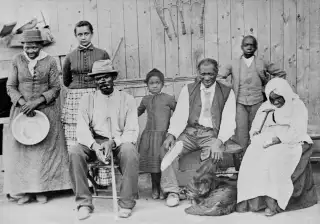9 Fascinating Facts About Harriet Tubman, the New Face of the $20 Bill

American abolitionist (extreme left, holding a pan), photographed with a group of slaves she helped escape. Bettmann—Bettmann Archive
The U.S. Treasury announced to great fanfare Wednesday that famed abolitionist Harriet Tubman will replace Andrew Jackson as the face of the $20 bill. But, though her exploits as a courageous rescuer of slaves in the Underground Railroad are well known, Tubman was even more awesome than many people realize. From scraping together the cash to hire a lawyer as a young slave to donating what little she had to the poor as an old woman, here are 9 things you may not have known about Harriet Tubman's extraordinary life.
- Araminta Ross was born around the year 1820. She later took the name of her first husband, John Tubman, and changed her name to Harriet in honor of her mother. In 1845, Tubman scrounged together $5 to hire a lawyer to look up her mother’s owner’s will, which she believed stipulated that members of her family be freed at age 45. She was right, but her new owners refused to honor the will. Years later, Tubman's father purchased her mother's freedom. The price? $20.
- In 1849, Tubman’s owner died, leaving his Maryland plantation in financial ruin. Three of her sisters were sold and she and two brothers escaped. A $300 reward—worth roughly $8,500 today—was offered for their capture.
- Tubman didn’t just shelter and smuggle dozens of slaves to safety. During the Civil War she worked as a spy, a scout and a recruiter of former slaves into an African American Union regiment.
- During the war, Tubman helped lead a hugely successful military raid—the first woman to do so—in South Carolina that freed more than 700 slaves.
- According to the Harriet Tubman Historical Society, for her three years of work in the Civil War Tubman was paid just $200—about $5,700 in today’s money. She fought, with little success, for fair compensation for her war efforts for the rest of her life.
- In 1859, abolitionist, U.S. Senator and later Secretary of State William Seward sold Tubman a piece of land near Auburn, New York, for $1,200—about $34,000 today—that was her home thenceforth. She struggled to pay off the purchase for the duration of her life, eventually getting a small war widow's pension because her husband had been a veteran.
- In 1873, already a famed civil rights activist, Tubman was reportedly beaten and robbed of $2,000—roughly $57,000 today—by con men.
- In 1898, according to the Harriet Tubman Historical Society, Tubman underwent brain surgery (she suffered lifelong problems stemming from a childhood injury) but refused anesthesia. Instead she supposedly opted to bite a bullet, as soldiers had done during the war.
- Despite the financial troubles that plagued her throughout her life, Tubman’s generosity was legendary. She donated a piece of her property near Auburn to become a home for poor and elderly African Americans, and a few years later she herself became a resident. She died there in 1913 and was buried with military honors.